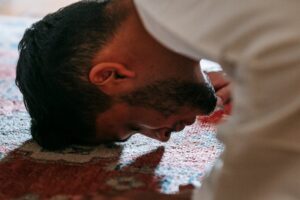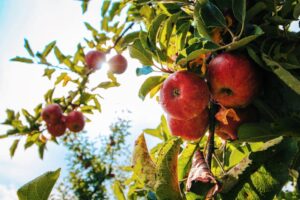وَالَّذِينَ إِذَا ذُكِّرُوا بِآيَاتِ رَبِّهِمْ لَمْ يَخِرُّوا عَلَيْهَا صُمًّا وَعُمْيَانًا ﴾٧٣﴿
وَالَّذِينَ يَقُولُونَ رَبَّنَا هَبْ لَنَا مِنْ أَزْوَاجِنَا وَذُرِّيَّاتِنَا قُرَّةَ أَعْيُنٍ وَاجْعَلْنَا لِلْمُتَّقِينَ إِمَامًا ﴾٧٤﴿
“And they are the ones who when reminded of the revealed verses of their Lord do not fall deaf and blind to them. And they are the ones who say: Our Lord! Grant us in our spouses and our children the joy of our eyes. Moreover, make us an exemplar of goodness for the God-fearing.”
(Translation by Ahmad Zaki Hammad)
The Holy month of Dhul-Hijjah has come to an end, let us briefly ponder on a journey that has just been completed by millions of Muslims around the world. It is arguably the best act of worship. It is a worship that stands alone as its own pillar of five in the Islamic faith. Indeed, it is Al-Hajj (Pilgrimage). Al-Hajj is a spiritual journey that millions of Muslims around the world who come from all walks of life embark on. All of these people come together to the same place at the same time for the same sole purpose: to worship the one and only Allah ﷻ. Surely, there is nothing else in this dunya that has the capabilities to do such a thing.
Hajj is a time when one cannot even be distinguished from another. You cannot tell wealthy from poor or famous from non-famous. Hajj is an act of worship that does not discriminate between one another on the basis of their skin color, gender, ethnicity, or culture. In which, it is in direct relation to how Allah ﷻ sees his servants all the same. It does not matter who we are, where we come from, or what sins we have committed. At the end of the day, we all are alive for the same purpose and will end up in the same place after death falls upon us.
Prior to Ramadan, we were covering a series about the “Slaves of the Most Merciful.” We learned about the qualities and traits these special individuals possess that allow them to be given this high-ranking position, as stated at the end of Surat Al-Furqan. We will be concluding this series this month with a couple more qualities. As a recap, last month we took a closer look at the Slaves of the Most Merciful and learned that they are individuals who spend in balance. They are not excessive in their spending nor are they the other extreme, being very stingy. We also learned that this group of people do not fornicate, do not take another individual’s life, and worship no other deity besides Allah ﷻ. Lastly, this group of people who may have committed serious acts of sin, are still given a chance by Allahﷻ to be forgiven by turning back to Him ﷻ and repenting.
The next quality of a slave of the most merciful is stated in verse number 73. The true slaves of Allahﷻ are those who when they are reminded of something about Allahﷻ, they do not turn away and give a blind eye to it. They listen and follow. This relates to when you are sitting in a Friday Khutbah or lecture at the Masjid and the Imam talks about something and you feel as though he is talking directly to you although the Imam has no idea who you are. Allahﷻ knows you and He ﷻ used the imam to make you feel that way, to make you feel guilty and turn back to Him ﷻ.
This also can relate to advice. When another Muslim comes to you with a good intention and tries to give you advice in the right way, meaning in private, how do you take this advice? How do you respond to this individual? Do you accept this advice or do you reject it? If you reject the advice and arrogantly turn the individual away, then surely you must check your intention and sincerity. Maybe Allah ﷻ sent that person to you as a messenger and now you just rejected him out of arrogance. On the other hand, if you are attempting to be that person who gives advice with good intention, then you must remind people of the correct manner. You cannot stand up and begin naming people and their sins. That is simply because it is not your job to disgrace people. It is not your job to judge people and expose their sins. Who are you to do that when our own Lord does not even do such a thing? Allah ﷻ is the one who covers sins. It is up to Allahﷻ to judge a servant. When you give someone advice, you should first renew your intention and check your sincerity. Then you should approach the individual calmly and take them on the side in private. That is how you do your part the right way.
The last description that we will be covering this month and the series entirely, is verse number 74. Allah ﷻ says, “Those who constantly make a dua to Allahﷻ for their spouses and offspring to be the coolness of their eyes, and make us leaders of the righteous.” If you are close to Allahﷻ, you are not only worried about yourself. You are worried about others as well. These people make dua for their children and spouses to be righteous and amongst the close ones to Allahﷻ. We need to raise our children to love Islam ourselves. Don’t just wait for the school to do it because it is our job to do it as well. That is our job as parents. On top of raising their children the right way, they ask Allahﷻ to bless them as well. There is no greater dua in Islam than a dua for someone other than yourself. Does that mean that we cannot make dua for ourselves? Of course not. However, when you make dua for other people, the Angels make dua for you. So, in reality, you are receiving an even stronger dua, one from the blessed Angels.
To conclude, those who have all of these beautiful qualities will be given such a high place in Jannah known as “Al-Ghurfah.” Al-Ghurfah is a special place in paradise. They will be welcomed inside with a beautiful greeting. Peace will be upon these people. Imagine that at the point of death, you are shown this beautiful place in Jannah and told “don’t worry, you did good with Allahﷻ, now you have a wonderful gift waiting for you.” The angels who come to collect your soul will be angels of mercy, not punishment. You will be smiling as you depart from this dunya for the akhira. Now, at the doors of paradise, the angels will greet and say to you “Assalamualaikum! May peace be upon you. You have done good deeds so now you can enter paradise eternally.” سلامٌ عليكم طبتم فادخلوها خالدين.
By Ahmad Salah




